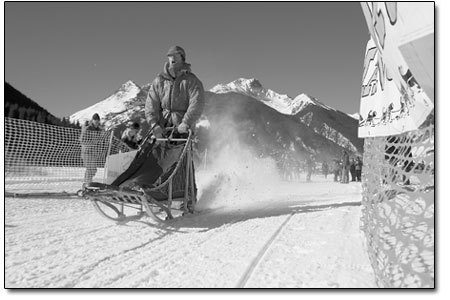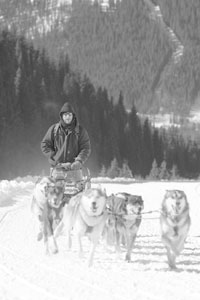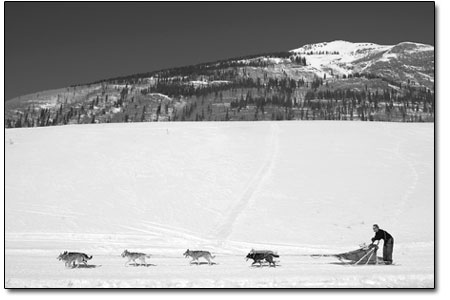| ||||||
| Going to the dogs Fourth annual Mancos Mush takes off this weekend SideStory: The fourth annual Mancos Mush Dog Sled races at a glance
by Michelle Duregger Howling Alaskan huskies will soon be lunging in their cross-backed harnesses in Mancos, as mushers work quickly to contain the excitement. Even in the 5-and-counting feet of snow, the Mancos Mush will go on, pouncing through the powder Feb. 8-10. Historically drawing big names like 27-time Iditarod veteran John Barron, the fourth annual Mush will include dog teams from throughout the West, including Utah, Oregon, Colorado and Wyoming. Originally a doubleheader event, this year’s race will feature only a 60-mile race in two legs. The 80-mile course, which typically takes racers over 10,000 feet to Windy Gap, has been cancelled due to high avalanche danger. Coming back for her third year, Kate St. Onge from Millville, Utah, is poised as a tough competitor – having taken second place in the IFSS (International Federation of Sledding Sports) World Cup in 2005, only 17 seconds behind the leading team. Though there are only nine competitors so far this year, many teams wait until after the Wyoming Stage Stop Race, held last week, to decide on Mancos. The deciding factor is the mental condition of the dog teams after a long season of racing. St. Onge has been running dogs since 1984 and knows from experience that in sprints (10 to 20 miles), much weight rests on physical condition. But circumstances change in mid-length races (30 to 80 miles). “You get through the physical aspect – most dogs can do it,” she said. “But the challenge comes in the mental stress.” As a case in point, St. Onge took a pass on the Wyoming Stage Stop Race after seeing the physical and mental stress her dogs would be put through. The five-day stage race begins with a 76-mile run. The second day, teams log 35 miles, then 54-, 63- and 45–mile days lead up to an 8-mile finish. The physical and mental strain of such a race is grueling, with no time to massage feet and rest dogs, and the threat of burnout is high. Kate made the decision to scratch the stage stop to save her dogs for Mancos. “Early to mid-January, you have to keep tabs on the mental status of the dogs,” she says. A despondent dog that has no spirit to run is not only heartbreaking, but no good for a team with a limited pool of dogs. For Kate and her husband, Rick, the recent
snow has made training 25 sled dogs an epic task. The St. Onges plan to run two teams at the Mush, and their combined pool will be about 18 to 20 dogs (each dog team is allowed a 10 dog pool and will run with an eight-dog string). “We’ve been wallowing in snow!” she exclaims. “The trails are so iffy. You don’t want to take too many chances.” The St. Onges have at least two days of running planned for the dogs this week, but snow and trail conditions will tell how much is in store. The chances of a sled careening off the trails or for dogs to get tangled are bad voodoo a week before the St. Onge’s favorite race. “Mushers shouldn’t complain about having too much snow, but we almost have too much.” As for the trails in Mancos, Trail Coordinator Skip Favreau is the resident expert and has picked what he feels are the prime trails. He owns a cabin 11 miles into the La Plata Mountains from the Mush’s starting line and has canvassed the area with his own dog team. In addition, the San Juan Sledders snowmobile club has its top trail groomer on the job. Roger Pennington will be spending a lot of quality time with the course this week as snow continues to fall. “It’s a shame we can’t go through the Windy Gap, the views are breathtaking,” Favreau says. Even so, the course is still spectacular, according to Volunteer Coordinator Tami Graham. “You’re up there looking down onto Utah and New Mexico in 5 feet of snow!” she says. Built on Forest Service roads, the course runs through open areas as well as aspen stands, allowing spectators to live vicariously through the mushers as they cheer them on. More adventurous souls may snowshoe and ski to other vantage points along the race course. The Mancos Mush was founded four years ago by Hesperus-based Durango Dog Ranch owners Greg and Gretchen Dubit. It has since matured into a nationally recognized event. The annual race will go off this weekend, thanks largely to the generosity of Durango and Mancos businesses. Fifty to 60 sponsors have signed on this year, according to Graham. “We’ve made it, and a lot of that is because we live in such a generous atmosphere.” In addition, the laid-back, snowy mountain atmosphere of the La Platas is perfect for dog sledding. The St. Onges can attest to the quality of the dog sledding – the husband and wife are in the process of building a house in Mancos. •
|
In this week's issue...
- December 18, 2025
- Let it snow
Although ski areas across the West have taken a hit, there’s still hope
- December 18, 2025
- Look, but don't take
Lessons in pottery theft – and remorse – from SW Colorado
- December 11, 2025
- Big plans
Whole Foods, 270 apartments could be coming to Durango Mall parcel




